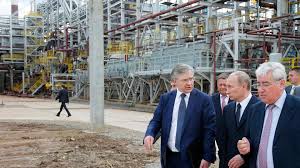On Monday, oil prices soared to their highest levels since 2008, as the US and its European allies discussed barring Russian oil imports and hopes for a quick return of Iranian crude to global markets faded.
Brent crude hit $139.13 a barrel in the opening few minutes of trading, and US West Texas Intermediate (WTI) hit $130.50, their highest levels since July 2008.
Brent was up 6.3 percent at $125.55 per barrel and WTI was up 6.7 percent at $123.37 per barrel by 1204 GMT.
Global oil prices, as well as other commodities, have risen by more than 60% since the start of 2022, prompting fears about global economic growth and stagflation. China, the world’s second-largest economy, has already set a goal of 5.5 percent growth this year.
On Sunday, US Secretary of State Antony Blinken said the US and European allies were looking into barring Russian oil imports, while the White House was working with congressional committees to move through with a US prohibition.
“We see $125 per barrel, our near-term projection for Brent crude oil, as a soft cap for prices,” said UBS commodity analyst Giovanni Staunovo, “but prices might surge even higher if disruptions increase or continue for a longer duration.”
According to him, if the war continues, Brent might rise above $150 per barrel.
According to Bank of America analysts, if most of Russia’s oil exports are halted, a 5 million barrel per day (bpd) or higher shortage may occur, sending prices as high as $200 per barrel.
Oil might rise to $185 this year, according to JP Morgan analysts, and $180 this year, according to Mitsubishi UFJ Financial Group Inc analysts.
With exports of roughly 7 million barrels per day (bpd), or 7% of global production, Russia is the world’s leading crude and oil product exporter. Kazakhstan’s oil shipments from Russian ports have also been hampered in several ways.
The chairman of Japan’s largest business organization indicated that Russia’s crude shipments could not be replaced right away. Russia is Japan’s fifth-largest crude oil and liquefied natural gas supplier (LNG).
Meanwhile, discussions to resurrect Iran’s 2015 nuclear deal with world powers have stalled as Russia wanted a guarantee from the US that sanctions imposed on it as a result of the Ukraine crisis will not harm its commerce with Tehran. China has also made additional demands, according to sources.
On Monday, France warned Russia not to use blackmail in its efforts to resurrect the nuclear deal, while Iran’s top security official acknowledged the talks’ prospects “remain unclear.”
“The only major bearish factor hanging over the market was Iran, but if the Iranian deal is delayed now, we might get to tank bottoms a lot faster, especially if Russian barrels remain off the market for a long time,” said Amrita Sen, co-founder of the think tank Energy Aspects.
Even if Iran achieves a nuclear deal, many believe it will take several months to restore oil shipments.
Separately, in their first high-level bilateral talks in years, US and Venezuelan officials discussed the possibility of easing oil sanctions on Venezuela but made little progress toward a deal, according to five sources familiar with the matter, as Washington seeks to distance Russia from one of its key allies.

















